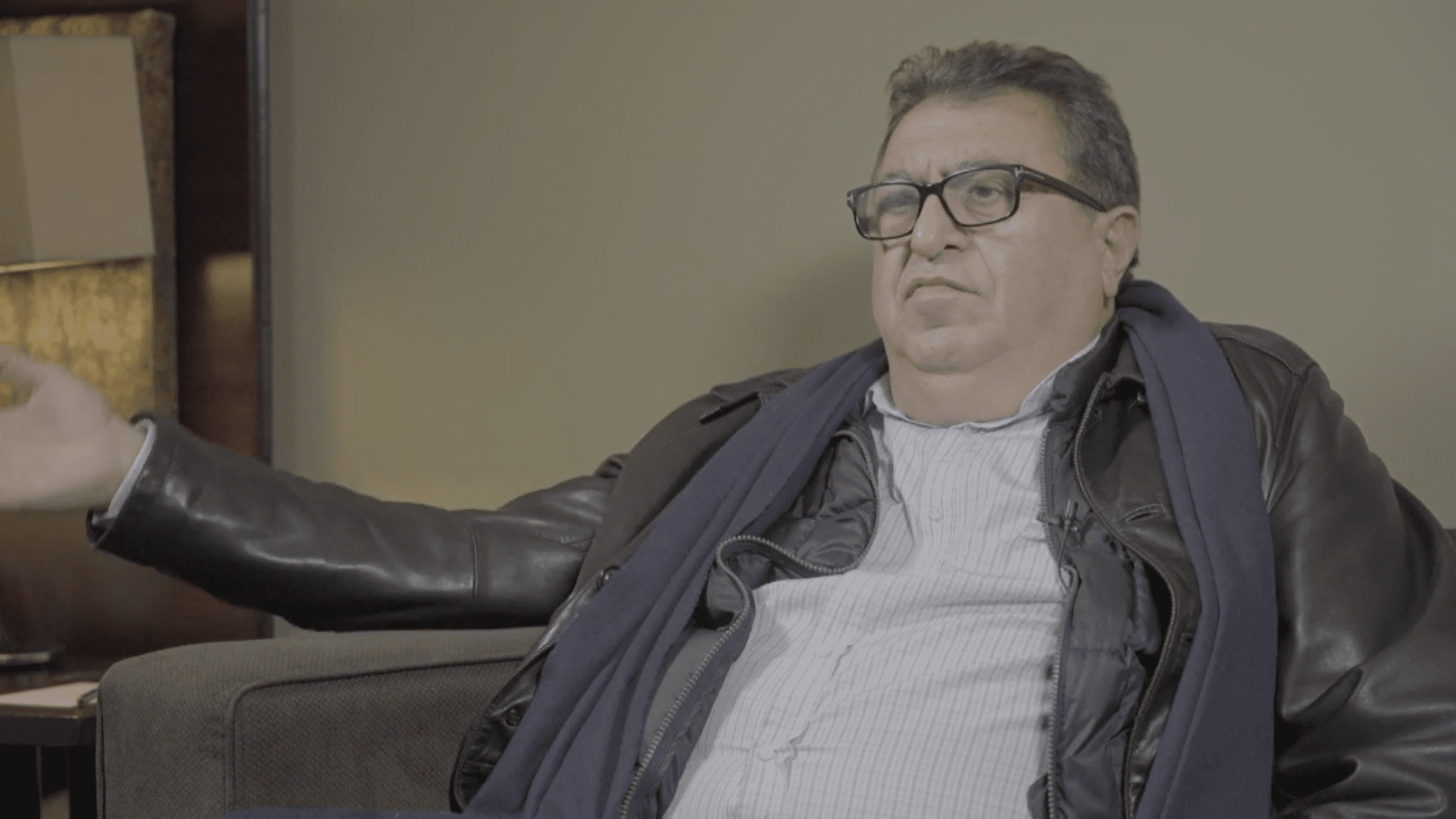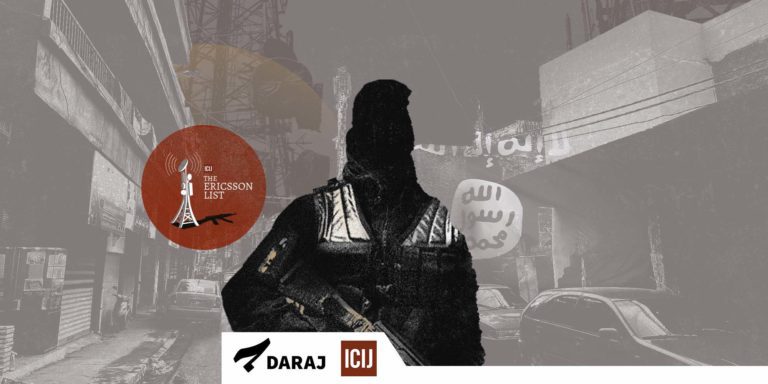The Iraqi investigative journalist, Delovan Berwari, contributed to this report.
A catastrophe hit the Raad family in late 2021 when brothers Hamza and Ali fell from a communications tower in Baghdad governorate. Severely injured, both brothers are bedridden. The disaster is not limited to their physical condition, but also concerns them not having access to proper health care and coverage.
Hamza and Ali are paying the price of depriving workers in the Iraqi telecom sector of their minimum rights in terms of health and social security, as major national and international companies are more concerned with evading taxes.
The Ericsson documents stem from the telecom company’s confidential internal investigation into its work in Iraq. Obtained by the International Consortium of Investigative Journalists (ICIJ), which shared them with more than 110 journalists from 30 media organizations in 22 countries around the world, including Daraj, the documents reveal the Swedish firm has engaged in illegal conduct, including bribery, tax evasion, violations of the Code of Business Ethics (CoBE), as well as “possible” payments to members of the Islamic State of Iraq and Syria (ISIS).
Hamza and Ali were working on a telecom tower belonging to Kuwaiti telecom firm Zain, when a worker fell down on top of them. Both brothers were paralyzed and are still unable to move. Ali’s spinal operation costs some $8,000. His friends are working to raise the required amount, according to their friend, telecom engineer Omar Ayad.
Underreporting Wages
Ayad left the telecom sector under quite different circumstances. A father of two, he is from Mosul. His fear of a future in a country where citizens do not know when they will be killed by a stray bullet or missile, or extremists, prompted him to abandon his job in the telecom sector, in which he invested more than ten years of his life. He opted for a job in the public sector for less than half his salary. Having enjoyed a salary of over $1,700 a month, he took a step many people may consider insane, as his current salary is only $450. But the public sector provides him with social security and the guarantee that his children’s future is safe. In addition, he launched his own private business to maintain the same standard of living.
(1) For every year of work, the worker is entitled to 30 days’ sick leave paid by the employer.
(2) Sick leave to which a worker is entitled under subsection (1) may be accumulated for a total of up to 180 days.
(3) When an insured worker has exhausted all of his paid sick leave and remains uncured, he shall be subject to the provisions of the Law on pensions and social security for workers.
(4) The Social Security Office shall reimburse the employer for the wage sums paid by the employer to the working during the period of sick leave exceeding the 30 days’ sick leave per year pursuant to subsection (1) and (2) of this section.
In an interview with Daraj, telecom engineer Amir (pseudonym), who has worked for Zain for about a decade, said his contractual salary is about $400, but his actual salary is $2,000. In other words, the salary reported by the company to the authorities is 80% less than the actual salary, which significantly reduces the income tax the company has to pay.
| Income | Tax ratio |
| From 1 to 250,000 Iraqi dinars | 3% |
| From 250,000 to 500,000 Iraqi dinars | 5% |
| From 500,000 to 1 million Iraqi dinars | 10% |
| 1 million Iraqi dinars and above | 15% |
Telecom engineers interviewed by the Daraj investigation team said employees in some companies, most notably Zain, had raised their voices regarding their rights, yet this did not lead to tangible results.
Amir related how Zain employees had protested for their rights regarding social and medical security. Yet, according to him, members of the parliamentary committee, which had promised to follow up on the file and support the employees, met with Zain officials to discuss the matter and left the meeting with briefcases, most likely filled with money. The employees saw their case being closed, as the decision regarding their rights was left up to the company.
In Iraq, three main telecom companies (vendors): Ericsson, Nokia Siemens and Huawei, work with three main operators: Zain, Korek and Asiacell. However, they only employ a small number of highly paid staff, often foreigners. Most of the actual work is done by layer upon layer of contractors. So, the work on the ground is done by people like Hamza and Ali, who work in extremely harsh conditions with no social security or medical insurance, not even in case of work accidents.
Work accidents. The major telecom companies active in Iraq save a lot of money by working through layers of subcontractors that evade paying taxes and health insurance at the expense of the employees. Most contracts do not specify working hours. A prominent businessman said on condition of anonymity: “Subcontractors are the best mechanism to launder commissions in in engineering and procurement contracts.”
“Evidence indicates that Ericsson reported $60 million less to the tax authorities than Zain Iraq, and thus, Ericsson did not pay the correct taxes related to the Zain project,” according to the Ericsson investigation. The regions of Baghdad and Kurdistan are subject to the same federal laws. But Ericsson has not paid proper taxes in Erbil since 2012.
Ericsson was assisted by Al-Awsat owned by the influential Kurdish businessman Jawhar al-Sourchi and his partner Nawar Jassim al-Jabouri. The company acted as a consultant to Ericsson to help the latter in complying with Iraqi laws and regulations, including those regarding social security and tax matters. It also acted as an intermediary in dealing with the Iraqi government on behalf of Ericsson.
In Baghdad, the investigation also found violations of regulations regarding social security fees and tax clearance. In 2014 and 2015 Ericsson received two warnings from the Iraqi Social Security Department (SSD) for non-compliance with social security fees. Ericsson assigned Ernst & Young to draft an exemption letter to the SSD in 2014, yet the letter was never submitted. Al-Awsat intervened to resolve the matter by registering 12 of its staff as Ericsson employees, according to the report submitted to the SSD. The same scenario was repeated in 2015. The payment for the social security contribution did not exceed $720,000, in contrast to an expected $2 million. The company’s internal investigation indicates that the company had “deceived” the SSD and “falsely registered” Al-Awsat employees as employees of Ericsson.
This in addition to: The misrepresentation of financial statements submitted to the authorities where Ericsson intentionally falsified documents related to costs. In Kurdistan, Ericsson provided false annual financial statements whereby only the expenses, not revenue, were reported. Also, it did not provide the Kurdish authorities with the correct documentation regarding taxes and social security. Only in 2019, Ericsson presented its correct financial position and applied for amnesty.
Corruption Through Intermediaries
Ericsson is not the first, and will not be the last, foreign company to operate in the region in “ambiguous” ways. However, it protects itself by hiding in a Pandora’s box that consists of several intermediary companies, most notably:
Al-Awsat and its sister firm Al-Awsatiya.
Ericsson’s relationship with Al-Awsat owner Jawhar al-Sourchi dates back to a 2003 telecom tender conference in Jordan, which was sponsored by the US occupation administration in Iraq. Tarek Saadi, the Ericsson executive responsible for business development in Iraq, met with al-Sourchi and introduced him to other company officials. “He has a solid business knowledge and understanding of the Iraqi situation,” said Saadi in the 2019 internal Ericsson investigation.
In the same investigation Jawhar al-Sourchi said his company provided many services to Ericsson and claimed the Swedish firm would not have been able to operate in Iraq without its help. Ericsson’s internal investigation indicates that Al-Awsat helped Ericsson in dealing with social security issues by avoiding to pay income taxes.

Jawhar is the son of Hussein Agha Sourchi, who used to be a leader of “Saddam’s Juhosh,”which is the name the Kurds give to people of their own, who fought with Saddam against the Kurdish Peshmerga. It seems al-Sourchi Sr. formed a parallel leadership that threatened the Barzanis, leaders of the Kurdistan region.
At one point, al-Sourchi Sr. was deceived, as he was told that Masoud Barzani would have lunch at his house to resolve their disputes. Instead, a group of gunmen appeared and killed al-Sourchi Sr. and some 15 others.
Several years later a settlement was reached, through which his son Jawhar received $12 million. He was also promised advantages in business deals, according to someone who lived during that time.
As for Jawhar’s brother, Tharwat Hussein Agha, he is an advisor to the current Iraqi president, Barham Salih. Interestingly, the latter does not have a good relationship with the Barzani family. Documents of the internal Ericsson investigation furthermore revealed systematic manipulation in selecting suppliers for the benefit of some companies. Al-Awsat, for example, was favored in Ericsson’s project with the Iraqi Ministry of Defense. The internal investigation found that Al-Awsat received favorable scores thus the supplier selection process was manipulated for its advantage.
As for the Peroza Project, which concerned the transition (SWAP) from second generation (2G) to third generation (3G) of wireless mobile telephony between Ericsson and operator Asiacell, Al-Awsat did not provide the full price. As a result, it was chosen without a fair competition with other companies. For example, the agreement between Al-Awsat and Ericsson entailed that the latter would rent the warehouse for equipment, while Al-Awsat would operate it.
The documents show that Ericsson paid Al-Awsat a fixed amount of $675, which is the cost of operating 60 sites totaling $40.5K per month, despite the fact that no new sites were being assembled. Tarek Saadi had recommended that there would be monthly purchase orders for Al-Awsat, regardless of the fact if there were deliveries or not.
Between 2011 and 2018, Ericsson’s total spending on Al-Awsat amounted to more than $90 million for various services, including consultancy, officially worth $27.5 million, although the documents do not show activities worth that amount, and $500,000 for security services that were never received, according to Ericsson’s investigation.
The Asiacell management was an essential part of the deal, as it requested additional funds to offer Ericsson more business in Iraq. For example, two purchase orders under the title “security services” were added to the agreement with Al-Awsat, which were not included in the original proposal/offer.
The documents reveal that these orders were in fact commissions requested by Tarek Saadi for the CEO of Asiacell. The documents do not mention his name, but Amer Al-Sanna has been CEO of the firm since 2013.
The documents also indicate that Ericsson paid “bribes” to the Asiacell CEO in order to win the Peroza project. Payments were made through Al-Awsat. One Ericsson employee furthermore purchased a $1,750 artwork as a company gift to the Asiacell CEO in August 2014, illustrating the “lack of controls on spending.”
The Daraj team working on this project sent questions to the Chairman of the Board of Directors of Asiacell, Mustafa Farouk Rasoul, along with the CEO, but did not receive a response from him or the company. As for Al-Awsatiya, it is owned by Bassam Shaqman, an old friend of Jawhar al-Sourchi. The company is headquartered in Jordan. Ericsson began working with the firm in 2012, due to the inability of Al-Awsat to perform some tasks due to its presence in Iraq.
However, the payments for both companies were transferred to Al-Awsat’s bank account. Note that a financial audit conducted by Ernst & Young for Ericsson in 2017 showed that most of Al-Awsat’s dues were transferred to Jawhar al-Sourchi’s personal account in Jordan. Al-Awsat at first did not have a stake in Al-Awsatiya, yet since August 2019 it owns 80% of its shares. Al-Awsatiya received over $10.5 million between 2012 and 2016, most of it for a project with the Iraqi Ministry of Defense. The money was again transferred to Al-Awsat, according to Ericsson investigation’s documents.
TUBA and its sister company TOBAC
Lubna Majeed is the wife of Awsat general manager Nawar Jassem al-Jabouri. She owns 70% of management and consultancy firm TUBA, while her brother, Muhammad Majeed, owns the remaining 30%. TUBA was established in Baghdad in 2011. Ericsson paid the company a total of $30 million from its inception until 2019. TUBA became an official supplier of Ericsson three weeks after its registration in Iraq.
Jordanian national Aoun Damra is the brother of May Damra, sourcing business partner at Ericsson. He has been general manager of TUBA since 2012 and owns 10% of the shares of its sister company TOBAC. Muhammad Majeed owns the remaining 90%.
Between 2017 and 2019, TOBAC received $7.5 million although the two sister companies did not have the required experience. Ericsson did not follow the approved evaluation process in selecting suppliers.
According to the investigation’s internal documents, Aoun Damra said Ericsson had asked him to perform some illegal acts related to not paying social security fees. There was moreover a conflict of interest, as his sister worked at Ericsson while he was a supplier. Worse, she was a member of the committee that selected her brother’s company.
Through Al-Awsat and other contractors Ericsson evaded paying taxes to the Iraqi state. And those who received reduced salaries were deprived of their basic rights to health care and social security.
The internal investigations which ICIJ obtained and shared with its partners, including Daraj, demonstrate that the Swedish multinational – with a 2021 net income of $2.5 billion – abides by the basic labor rights treasured in Europe, but does not hesitate to engage in business tainted by suspicions of corruption elsewhere.
Read Also:







